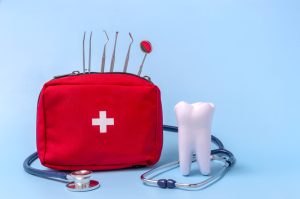Stay Prepared In A Dental Emergency

Auburn, IN, dentist Dr. David Painter from Auburn Family Dentistry will walk you through the essential items to include in your home dental first aid kit and provide tips on using them effectively. By following these recommendations, you’ll be better equipped to handle common dental issues that may arise unexpectedly.
Schedule your appointment at Auburn Family Dentistry today by calling (260) 357-2380.
Essential Components of a Dental First Aid Kit
Pain Relief Medications
One of the most important elements of your dental first aid kit is over-the-counter pain relief medications. These can help alleviate discomfort associated with various dental issues:
- Acetaminophen (Tylenol)
- Ibuprofen (Advil or Motrin)
- Aspirin (for adults only)
Remember to always follow the dosage instructions on the packaging and consult with a healthcare professional if you have any concerns about taking these medications.
Oral Anesthetic Gel
An oral anesthetic gel containing benzocaine can provide temporary relief for tooth pain, gum irritation, or mouth sores. Apply a small amount directly to the affected area using a clean cotton swab or your finger.
Salt
Salt is a versatile and natural remedy for various dental issues. Mix a teaspoon of salt with warm water to create a saltwater rinse, which can help:
- Reduce swelling
- Alleviate pain
- Clean wounds
- Promote healing
Dental Floss
Dental floss is essential for removing food particles stuck between teeth, which, if left untreated, can cause pain and lead to infection. Include both regular floss and floss picks in your kit for convenience.
Temporary Filling Material
Temporary filling material can cover exposed tooth pulp or replace lost fillings. This helps protect the tooth and reduce sensitivity until you can see a dentist. Look for over-the-counter products specifically designed for this purpose.
Dental Wax
Dental wax is useful for covering sharp edges on broken teeth or irritating orthodontic appliances. It can help prevent further injury to the soft tissues in your mouth and provide temporary comfort.
Cotton Balls and Swabs
Cotton balls and swabs are versatile tools for applying medication, cleaning wounds, or controlling bleeding. Make sure to include a good supply in your kit.
Gauze Pads
Sterile gauze pads can be used to apply pressure to bleeding areas or to clean wounds. They’re also helpful for removing debris from the mouth.
Dental Mirror
A small dental mirror can help you examine hard-to-see areas of your mouth, making it easier to identify the source of pain or discomfort.
Tweezers
Tweezers can be used to remove foreign objects stuck between teeth or in the gums. Make sure to sterilize them before and after each use.
Hydrogen Peroxide
Hydrogen peroxide can be used as a disinfectant and help clean wounds in the mouth. Dilute it with equal parts water before use.
Ice Pack
An ice pack or cold compress can help reduce swelling and numb pain associated with dental injuries or infections. Include a reusable ice pack or instructions for making a simple ice pack using a plastic bag and ice cubes.
How to Use Your Dental First Aid Kit
Toothache Relief
If you’re experiencing a toothache:
- Rinse your mouth with warm saltwater.
- Gently floss around the affected tooth to remove any food particles.
- Apply a cold compress to the outside of your cheek near the painful area.
- Take over-the-counter pain medication as directed.
- Use oral anesthetic gel for temporary relief.
Knocked-Out Tooth
If a tooth has been knocked out:
- Handle the tooth by the crown (top), not the root.
- Rinse it gently with milk or saline solution if it’s dirty.
- Try to reinsert the tooth into its socket if possible.
- If reinsertion isn’t possible, store the tooth in milk or saliva.
- Seek immediate dental care within 30 minutes for the best chance of saving the tooth.
Broken or Chipped Tooth
For a broken or chipped tooth:
- Rinse your mouth with warm water.
- Apply a cold compress to reduce swelling.
- Cover any sharp edges with dental wax to protect your tongue and cheeks.
- Use temporary filling material if there’s significant damage or sensitivity.
Lost Filling or Crown
If you’ve lost a filling or crown:
- Clean the affected area gently with warm water.
- Apply clove oil to the exposed tooth for pain relief.
- Use temporary filling material to cover the exposed area.
- If you have the crown, try to reattach it temporarily with dental cement.
Maintaining Your Dental First Aid Kit
To keep your dental first aid kit effective and ready for use:
- Check expiration dates regularly and replace expired items.
- Replenish supplies after use.
- Store the kit in a cool, dry place away from direct sunlight.
- Include a list of emergency dental contacts and your regular dentist’s information.
- Review the contents of your kit annually and update as needed.
Contact Auburn Family Dentistry In A Dental Emergency
Creating a dental first aid kit for home emergencies is an important step in protecting your oral health. By assembling these essential items and understanding how to use them, you’ll be better prepared to handle unexpected dental issues.
Remember, while a dental first aid kit can provide temporary relief and protection, it’s not a substitute for professional dental care. Always follow up with a dentist as soon as possible after using your kit to address any underlying issues and prevent further complications. Call [phone number] to schedule your emergency appointment with our Auburn, IN, dentist.
